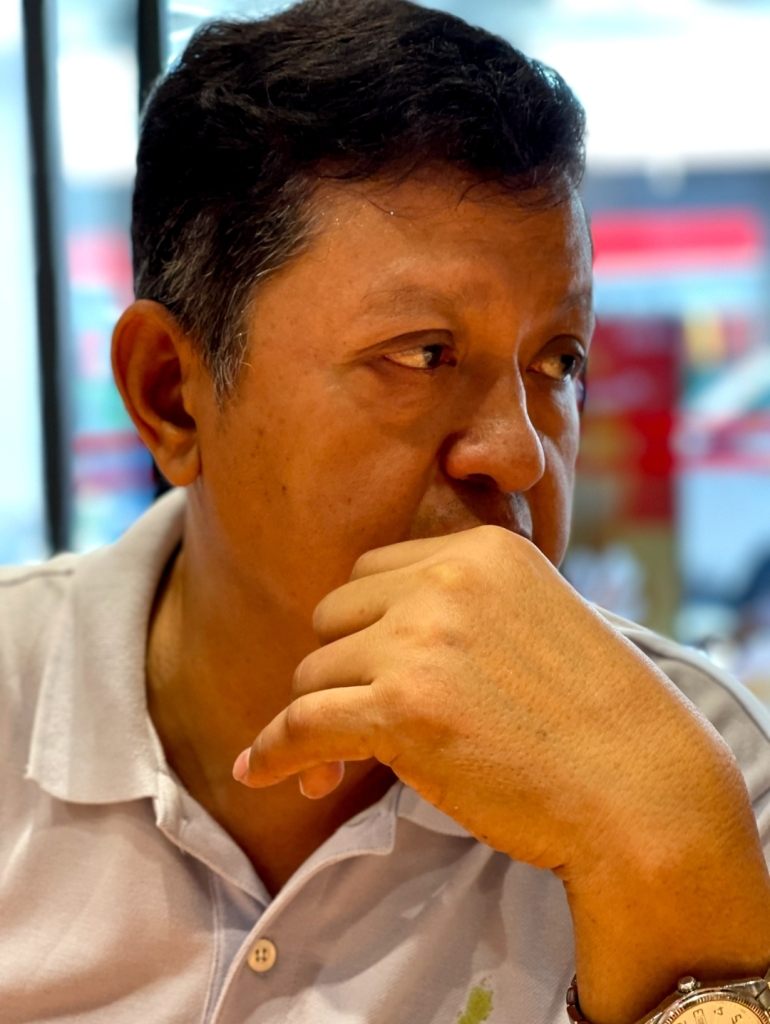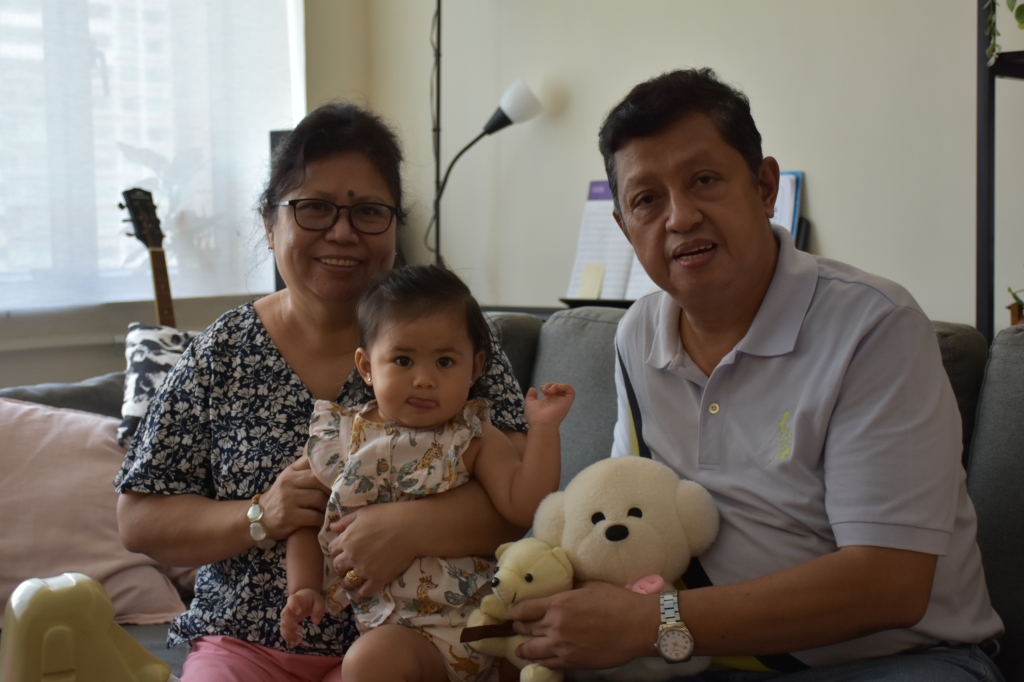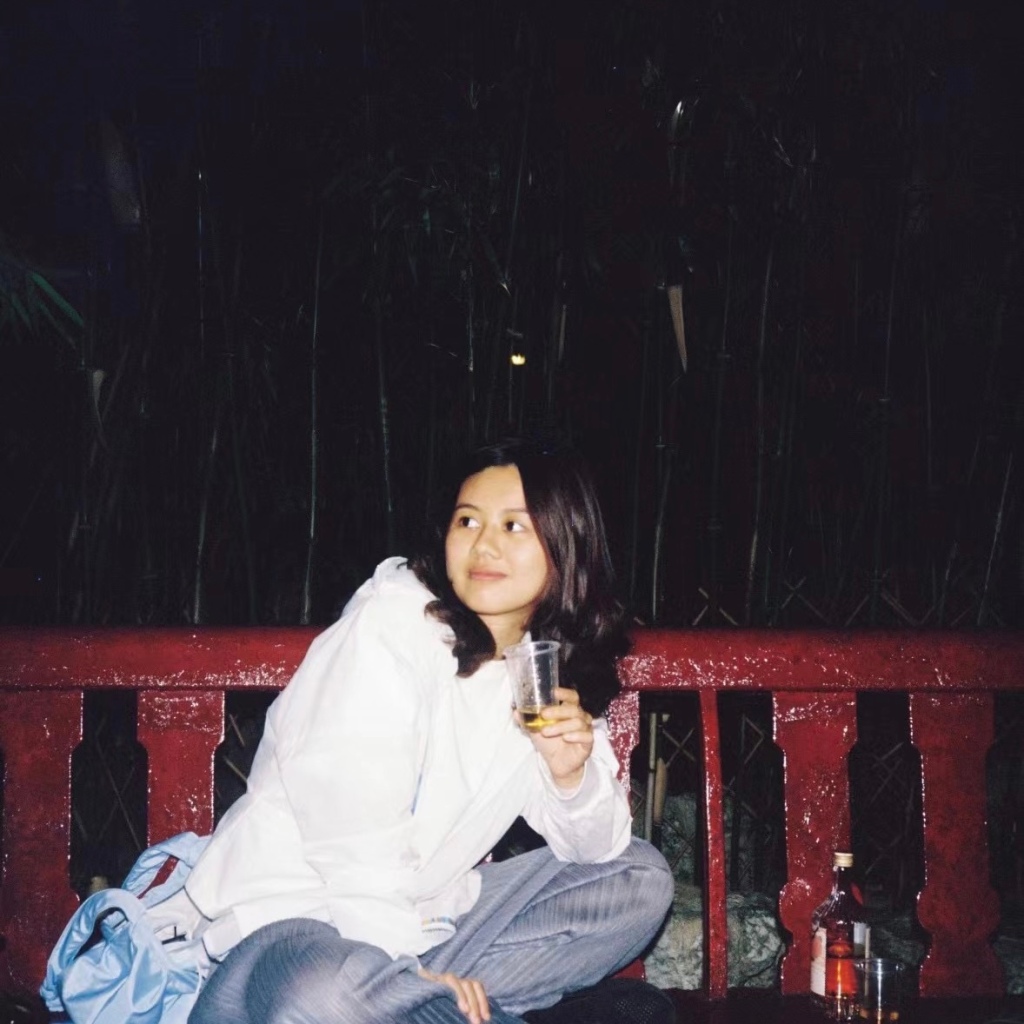Amalia Huang Yuncen
Dante, whose full name is Rodantes V. Quejano and whose nickname is Atan, acquired his Bachelor’s degree in Business Administration from University of the East Manila. He arrived in south China in the fall of 1988 and for a while drifted between Hong Kong and Macau until he landed a temporary job in Macau as a janitor and construction worker. He said it was not difficult to find jobs through newspapers such as South China Morning Post and Macau Daily, but they mostly had a requirement: applicants had to have a work permit and know English and Chinese. For newcomers like Dante, these barred him from qualifying for many jobs, thusly he spent the first two years of his life in Macau working various part-time jobs and saving money to afford developing ID photos and printing resumes that would go with posting off application letters. In our interview, Dante recalled one of his most whimsical part-time jobs: welcoming Jackie Chan to Macau during the 1988 Grand Prix, where he stood next to the red carpet and waved flags for $50 that day.

In his early days, Dante joined a construction company between 1988 and 1990. He was without a legal work permit for a few months and the officers had to check his passport whenever he travelled between Macau and Taipa via the old bridge. Fortunately, he said, they only checked the documents perfunctorily and never turned to the visa page. Through the help of the sisters of a Catholic church, Dante found his first full-time job in 1990. He served as librarian and administrator at Yue Hwa High School, where he rebuilt the library collection and also taught basic accounting. The school sponsored the issuance of his first blue card, permitting Dante the right to live in Macau for work. According to Dante, there was a staff shortage at that time and the school had to “break one person into three pieces”— he had to work round-the-clock, preparing to teach, correcting assignments, and handling paperwork in non-working hours. He further helped to recruit student volunteers, assigning them to help in updating borrowers’ records.
For non-resident workers like Dante, one of the most significant developments in 1980s Macau was the legalization of once-illegal immigrants. From the 1982 Undocumented Workers Registration Campaign to the 1989 “Operation Dragon”, more than 100,000 mainland residents entered Macau. The majority of migrant workers had low levels of education and were only capable of working in manual jobs.
Although well-equipped with a Bachelor’s degree and fluency in English, Dante saw working in Macau merely as a means to acquire bread and butter. After two years working in a high school, Dante didn’t hesitate to take up an offer from a student to work as a bookkeeper for a Portuguese restaurant. Working in a restaurant paid about the same hourly rate, but the longer hours meant he could earn more. Before then, Dante had to rely mainly on the help of a Catholic church. After switching to his new job, his Portuguese boss helped him apply for a non-permanent resident ID card. In 1992, he started to gradually bring his family to Macau.
Today, youngsters who keep changing jobs are considered “not persistent” and “not stable enough”, but Dante liberally chose to do so because Macau was a city of endless possibilities. More importantly, the requirements to attain work visas were not as strict during the period of Portuguese governance and non-resident workers holding work visas could work several jobs simultaneously. Always ready to go where life took him, Dante left the Portuguese restaurant and worked as an opening team in Westin Resort Coloane. He would join the Sunshine Cleaning Company in 1993 as a project manager— a job through which he would eventually receive his permanent Macau resident card in 1997. Meanwhile, due to the lack of workers in the company, he called almost all his family members from Manila to work there. Since then, his family has been rooted in their new ‘home’ of Macau. This coincided with a time when the Macau economy began to falter: the GDP dropped sharply from 13.3% in 1992 to 5.2% in real terms in 1993 before becoming stagnant. In 1996, the overall economy fell into negative growth levels. The tourism and gaming industry also suffered severe setbacks, with the gaming revenue declining year after year and the number of visitors to Macau dropping since 1996.
Fortunately, this economic downturn did not affect Sunshine Cleaning’s ability to continue to contract projects. 80% of the projects Dante managed came from the government, including the Macau International Airport, which opened in 1995, the New Yaohan department store in 1997, and the Conde de San Januario Hospital, which was redeveloped in 1999, as well as public health centres, banks, and other projects. The name of Sunshine Cleaning Company can be found in the Macau Government Official Gazette Order No. 239/98/M, dated November 23, 1998, in the 47th issue, the company underwrote the contract for the cleaning and disinfection services of the Macau Cultural Centre for $705,000 for 2 years.
Dante’s previous experience of working with government parties broadened his contacts and sharpened his ability to handle important events. In the winter of 1999, he was in charge of the Macau handover ceremony as a project manager, overseeing the quality control of the venue, security work, and the rehearsal of the central performance of the Handover Ceremony. Dante mentioned that the organization of the Handover Ceremony took almost a year, while the actual preparation of the venue took only 3 days. He witnessed the ceremony as a citizen of Macau. At the scene, his Portuguese boss sadly told him, “Dante, now this land is the [sic]Chinese!”

In addition to the change of sovereignty, Dante felt, as a citizen, that “everything had become stricter”. The most perceptible change for him was the tightening of restrictions over work visas. As he remarked, Filipino migrant workers before 1999could work several jobs simultaneously, thus earning ample money to pay for their children’s college education back home. If their children studied electrical and mechanical engineering, they could come to Macau to find good jobs; however, after the handover, there were not as many opportunities for foreign migrant workers to earn money as before. Another significant change was the tightening of laws, which in his opinion, did not exactly equate to better security. In 2001, for instance, Law No. 16/2001 on the Operation of Casino Luck Gaming was passed with more criminal elements, yet security issues had not completely disappeared.
After being away from his native home for 13 years, Dante returned to the Philippines in 2001 for a 3-month vacation. There, he made several milestones in one go: he got married, built a house, and reunited with his family. Nevertheless, his entwinement with Macau and life’s vicissitudes did not stop there. He returned to Macau after his vacation to find that it was not easy to find another job due to the Asian financial crisis. Subsequently, his wife opened a small business and the whole family lived in the shop’s attic. In 2002, Dante applied for affordable housing through the government’s housing program. He waited three years for his application to be approved. Notably, the policy of competitive bidding for affordable housing was adjusted after the handover from every three years to six months from the day after the announcement of the final list of the last competitive bidding.

If the first half of his life in Macau was that of a courageous young man embarking into a foreign land, Dante’s life had entered a new phase by the twenty-first century: he began to put down roots in Macau. According to the documents of the Housing Bureau of the Macau SAR Government, in 2003, 6333 applications were received, 1845 were returned, and 1627 were accepted. In March 2004, 2981 applications were accepted in the new round of applications for housing. In 2003, Chuen Fu New Estate was completed on Rua do Regedor though it was not until 2005 that Dante’s application was finally accepted. His new place—a three-bedroom, two-bathroom apartment—would replace the attic of his wife’s store as the humble abode of the Quejano’s. Historically, Dante became the first Filipino to be granted government public housing out of over 4,000 applications since the opening of affordable government housing in the early 2000s.
Although Macau’s economy was in the doldrums around the time of the handover, Dante’s rich work experience provided the foundation for him to take off once again. Macau’s GDP proliferated after the government granted a gaming license in 2002, while the MICE industry, a related industry, found growth opportunities in venue construction and urban positioning. Our project manager Dante thus continued to work on major government projects from 2004 onwards. He was involved in the Macau East Asian Games and The Forum for Economic and Trade Co-operation between China and Portuguese-speaking Countries in 2005. He also took part in the preparation of the Macau team for the 2008 Beijing Olympics, managing the sports equipment and facilities in the East Asian Games stadium (known as the “Macau Egg”) and providing logistics for Macau athletes set to compete in Beijing. Dante admitted that the experience of being involved in a sporting event was quite unique. His previous jobs mainly evolved around preparatory work but serving the athletes made him feel “one step closer to the important events of this era”.

In 2008, another economic crisis swept through the city, costing Dante to become unemployed for seven months. He used his skills from managing projects at Sunshine Cleaning to work on cleaning, moving and transportation services. He also worked as a tour guide for Filipino travellers. Furthermore, Dante joined Plural Voices-Peoples of Macau, a new political party founded in 2009, and participated in the Legislative Assembly elections in the same year. He was the first Filipino in Macau’s history to run for the Legislative Assembly. His campaign was highlighted by his excellent interpersonal skills and the ability to converse with Macau’s diverse communities, as well as his active participation in public programs. Regrettably, at a time when the concept of “multiculturalism” had yet to seep into the mentality of the public, Plural Voices did not win a seat with 905 votes.
It’s no secret that Macau attracted foreign workers in better times and roused foreign workers in droves in terrible times. In 2009, the first phase of City of Dreams opened in Cotai and the emergence of giant companies began to bring people back. Grasping onto this transformation, Dante joined City of Dreams and worked in the House of Dancing Water in late 2009. He described this as his first and last job for a gaming company. It was of little relevance to his past work history as it was not linked to cleaning, managing, accounting, or logistics. He played as a “runner” for the show support department in the House of Dancing Water, assisting the actors on stage to bring to the visitors. He would remain in this position until 2016.
In December 2016, the owner of Livraria Portuguesa, a bookshop selling Portuguese titles, asked him if he wanted to work at the bookstore. The job didn’t require shift work, provided two days off a week and concerned occasionally moving goods, dealing with logistics and assisting in book fairs and literary events. He agreed to take the position and has been in the job since. I asked him if he felt sorry that he had to work behind a cashier in the bookstore despite having been involved in many big projects. He said no and added that he would retire to his home in the Philippines in a couple of years. Although his siblings had taken permanent residence in Macau with his help, he felt that he could always come back to Macau to visit his family and friends in the future and that Manila was where he wanted to be in the long-term.
Before coming to Macau in 1988, he had considered Southeast Asian countries such as Malaysia, Singapore, and even neighbouring Hong Kong but there were always some drawbacks to these cities or countries: either the cost of living was high, or the work was ‘too ordinary’. For Dante: he chose Macau and Macau chose him. More than a workplace, Macau gave him the opportunity to actively participate in the social spaces of the city’s Filipino community and Catholic church. He also extended a hand to Filipino friends and relatives who wanted to settle in Macau by helping them find jobs or accommodation. At present, Dante is the Vice Premier of the Quezonian Association of Macau and the head of the Couples for Christ in Macau. In his church, he is responsible for organizing significant festivals such as the Mayflower Festival for Macau’s Filipino community.

At present, Filipinos are the second largest community in Macau. Belonging to a generation of migrant workers that explored southern China during an early stage, Dante’s life trajectory and his life achievements are difficult to replicate today. Still, his presence inspires other Filipinos: he was the first Filipino to successfully apply for government public housing and to run for Legislative election. His experience has shown that while it is never easy to integrate locally into Macau society, it is not utterly impossible owing to the resilience of human beings. Looking back on Dante’s life in Macau, which has spanned more than thirty years, provides us with an intimate lens to retrace how a young man found his way in transitioning times and how Macau has continually risen and sunk along with the waves of the global economy. While the names of migrant workers like Dante Quejano do not appear in official records, this essay is an ode to them for having kept Macau running behind the curtain.

*We would like to extend our thanks to Dante, a friend of PMH, for agreeing to sit down and share his life story, which we hope echoes the experiences of many migrant workers in the city.
About Amalia:

Huang Yuncen is currently studying for a master’s degree in Macau Studies at the University of Macau. Curious, freewheeling but somehow sluggish. She is passionate about exploring urban landscapes and local theatre productions.
Well deserved Rodantes a.k.a. Atan for his better half Donna Quejano. Enjoy your special day today. Happy birthday amigo!
LikeLike
I am extremely grateful to having enjoyed the marvelous article. The article was so informative, considerate, and well-written. Your accurate explanation on the issue made the article simple for me to grasp the points that you were trying to express. Your focus on detail s had been remarkable, and displayed a deep knowledge of this subject. Thanks for the offering us with amazing article.
LikeLike